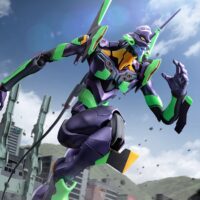Your basket is currently empty!
Evangelion Unit-01
Evangelion Unit-01, also known as EVA-01, is the central mecha of Neon Genesis Evangelion (新世紀エヴァンゲリオン), and one of the most iconic figures in anime history. Piloted by the series’ protagonist Shinji Ikari, EVA-01 is not a conventional robot but a bio-mechanical entity, combining cybernetic armor with a living, organic being underneath. It was developed by NERV and is the first non-prototype Evangelion unit to engage in full combat against the mysterious entities known as Angels.
EVA-01 was secretly constructed from the genetic material of Lilith, making it unique among the Evangelion units, which are otherwise derived from Adam. This origin grants Unit-01 special significance in the series’ mythos, especially regarding the Human Instrumentality Project. Unlike other EVAs, it frequently exhibits autonomous behavior, moving independently of its pilot—especially in moments of emotional or existential crisis. It has also demonstrated the ability to enter a berserk state, unleashing immense physical strength, regenerative abilities, and even reality-warping powers, hinting at a divine or primordial force within.
The unit is primarily equipped with a Progressive Knife (Prog Knife) and Pallet Rifle, but its greatest weapon is often itself—its teeth-baring jaws and claws capable of tearing through Angelic cores. It typically operates tethered via an umbilical cable to supply power, but in emergencies can function on internal battery power for a limited time.
Aesthetically, EVA-01 is tall, lean, and almost humanoid, with a distinctive purple and green color scheme and a single central horn, making it visually stand out among the other Evangelions. It stands over 40 meters tall and possesses an eerie, almost human presence—one amplified by the fact that its pilot is emotionally and neurologically synchronized with it via the Entry Plug system.
EVA-01 plays a central symbolic and narrative role in Neon Genesis Evangelion, representing themes of identity, parenthood, trauma, and transcendence. Its fusion of man, machine, and divinity—coupled with its pilot’s fragile emotional state—makes it both a weapon of war and a vessel for the show’s philosophical explorations. Over time, it becomes less a tool of defense and more an active participant in the cosmic fate of humanity, especially as the series moves into its surreal, metaphysical climax.
Showing the single result
- Out of stock
Blokees
Evangelion Unit-01 Action Edition
£31.99

